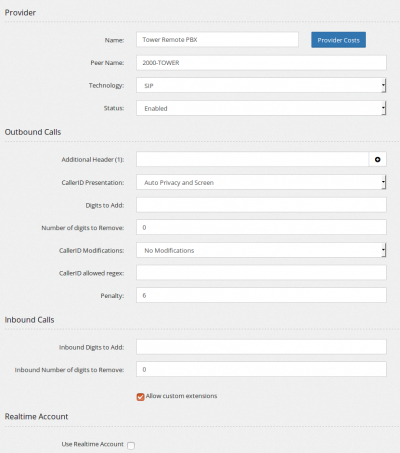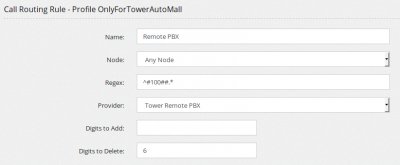Configure a remote PBX as part of the extension list: Difference between revisions
(Created page with "The case was more common than I initially though. The client you are going to move on the MiRTA PBX has several offices and not all of them will be immediately configured on t...") |
No edit summary |
||
| Line 18: | Line 18: | ||
[[file:tower-remote-provider.png|400px]] | [[file:tower-remote-provider.png|400px]] | ||
Define a "custom prefix" for routing calls to the remote PBX. I used #100##, but you can use anything that will never be dialed directly. Create a routing profile rule going to the provider created above | |||
[[file:tower-routing-rule.png|400px]] | |||
Revision as of 16:52, 8 June 2018
The case was more common than I initially though. The client you are going to move on the MiRTA PBX has several offices and not all of them will be immediately configured on the MiRTA PBX. So you'll have some extensions directly on the tenant and some other behind a remote PBX, like a FreePBX.
Let's make an example with a tenant named "TOWER"
Ext 4401 is on MiRTA PBX
Ext 4402 is on MiRTA PBX
Ext 4701 is on a remote FreePBX
Ext 4702 is on a remote FreePBX
Let's see how you can configure the tenant to allow any extension to call any other extension, as they are all on the MiRTA PBX
You need to start by creating a new extension, like 2000 and use that to register the FreePBX on MiRTA PBX. The FreePBX will be behind the extension 2000-TOWER.
Create a provider not using realtime account and assign the Peer Name as the extension used to register the FreePBX. In this case, 2000-TOWER:
Define a "custom prefix" for routing calls to the remote PBX. I used #100##, but you can use anything that will never be dialed directly. Create a routing profile rule going to the provider created above

